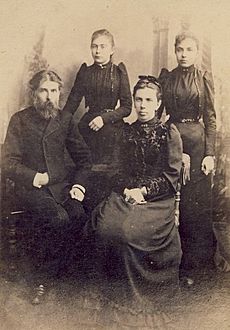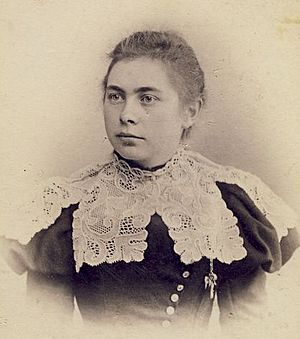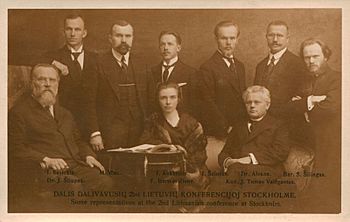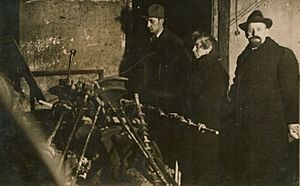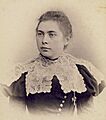Felicija Bortkevičienė facts for kids
Quick facts for kids
Felicija Bortkevičienė
|
|
|---|---|
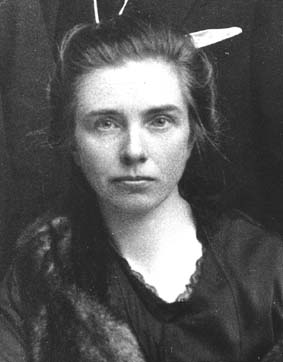 |
|
| Born |
Felicija Povickaitė
1 September 1873 Linkaučiai, Kovno Governorate, Russian Empire
|
| Died | 21 October 1945 (aged 72) Kaunas, Lithuanian SSR
|
| Resting place | Troškūnai |
| Nationality | Lithuanian |
| Alma mater | Flying University |
| Years active | 1899–1940 |
| Known for | Publisher of Lietuvos ūkininkas and Lietuvos žinios |
| Political party | Lithuanian Democratic Party Lithuanian Popular Socialist Democratic Party Peasant Union Lithuanian Peasant Popular Union |
| Movement | Lithuanian National Revival |
| Board member of | Žiburėlis Lithuanian Women's Association Lithuanian Women's Union |
| Spouse(s) | Jonas Bortkevičius (1871–1909) |
Felicija Bortkevičienė (born Povickaitė; 1 September 1873 – 21 October 1945) was a brave Lithuanian politician and a long-time publisher of important newspapers like Lietuvos ūkininkas and Lietuvos žinios. She became very active in public life after moving to Vilnius in 1900. She was known as a very energetic organizer, leader, and treasurer for many political, cultural, and charity groups.
Felicija was a leader in several political parties, including the Lithuanian Democratic Party and the Lithuanian Peasant Popular Union. She was a delegate at the Great Seimas of Vilnius in 1905, which was a big meeting for Lithuanian independence. She was even considered for important roles like a government minister and President of Lithuania. Bortkevičienė also started and ran several charity groups. These groups helped talented students, people jailed by the old Russian government, and Lithuanians forced to leave their homes during World War I. She was also a key member of the women's movement in Lithuania, working for women's rights. Because of her strong beliefs and actions, she was arrested and put in jail many times by different governments.
Contents
About Felicija Bortkevičienė
Her Early Life
Felicija was born in 1873 in the Linkaučiai Manor, which was then part of the Russian Empire. Her family, the Povickas, were Lithuanian nobles. Their family home was taken away because they were part of the Uprising of 1863 against the Russian Empire. Many of her relatives were jailed or sent away to Siberia. As a child, Felicija even visited her grandfather and uncles who were sent to Siberia. Because of this, she grew up with strong feelings against the Russian government.
She learned Polish from her father and a little Lithuanian from her mother. She later said that she didn't know much about the Lithuanian National Revival (a movement to bring back Lithuanian culture and language) until 1889.
Felicija was taught at home before going to school in Kaunas from 1885 to 1889. She was expelled from school for encouraging other girls to not pray in an Eastern Orthodox Church. But she managed to get into another school in Vilnius and graduated in 1890. For a year, she studied history and French at a secret school called the Flying University in Warsaw.
After her studies, she worked at a bank with her father until he passed away in 1898. This banking experience was very helpful later when she managed money for many organizations. In 1899, she married Jonas Bortkevičius, an engineer and childhood friend. Her family didn't approve because he wasn't from a noble family. The couple moved to Vilnius, where they became very involved in public life. Felicija became very passionate about the Lithuanian language and its revival.
Before World War I: Fighting for Freedom
In Vilnius, Felicija joined a secret group of thinkers called the Twelve Apostles of Vilnius. She got involved in book smuggling and publishing illegal Lithuanian newspapers like Varpas and Ūkininkas. She would send articles to the editors and raise money to print the papers. Sometimes, these illegal publications were hidden in the Church of St. Nicholas.
She became a key member of the Lithuanian Democratic Party, which started in 1902. She also joined the board of the Lithuanian Women's Association. Her home became a meeting place for many important thinkers and political groups.
Felicija supported the Revolution of 1905 against the Russian Empire. She provided money, materials, and even weapons to activists. She was a delegate at the Great Seimas of Vilnius, a very important meeting where Lithuanians discussed their future. During this meeting, the Peasant Union was formed, and Felicija became its manager. This group pushed for everyone to have the right to vote, no matter their gender, religion, or background. She was involved in almost every part of organizing and running the Seimas.
In 1906, when the revolution slowed down, Felicija focused on legal Lithuanian newspapers. She became the publisher of Lietuvos ūkininkas and Lietuvos žinios.
In 1907, she took part in the First Lithuanian Women's Congress. She also did a lot of charity work. She led the Žiburėlis society, which helped talented students from 1903 to 1940. She also helped the Martyr Fund, which supported activists who were treated unfairly by the Russian authorities. Because of her activities against the Russian government, she was put in jail four times. Her husband also spent time in jail, which made him very sick, and he passed away in 1909. Felicija used the money she inherited from him to keep publishing her newspapers. In 1915, she became the first woman Freemason in Lithuania.
During World War I: Helping Others
During World War I, Felicija moved to Russia and continued her public work. She organized help for Prussian Lithuanians who were forced to leave their homes. She traveled for five months to visit their communities. Her organization, the Lithuanian Care, helped about 4,000 Lithuanians. They also ran six elementary schools and four shelters for older people.
In 1917, she helped organize the Lithuanian conference in Petrograd. At this conference, she first supported Lithuania having some freedom within the Russian Empire, but she soon realized this was a mistake and wanted full independence. She became the treasurer of the new Lithuanian Popular Socialist Democratic Party. Later that year, she was a delegate at the Lithuanian conference in Stockholm. After that, she lived in Copenhagen and worked with the Red Cross. She helped organize aid for Lithuanian prisoners of war in Germany.
In 1918, she returned to Vilnius and started her political work again. She brought back the newspaper Lietuvos ūkininkas. When the Lithuanian–Soviet War began, the Lithuanian government was in trouble. Felicija encouraged Mykolas Sleževičius to become the Prime Minister. He thought about making her a government minister, but other members were unsure about having a woman minister.
When the government moved to Kaunas, Felicija stayed in Vilnius. In early 1919, she and other important people were taken as hostages by the Lithuanian Soviet government. They wanted to exchange them for communists held by the Lithuanian government. She spent six months in different prisons. In July, she was part of a prisoner exchange and returned to Kaunas.
After World War I: A Voice for Democracy
In July 1919, Felicija returned to Kaunas. In 1920, she was elected to the Constituent Assembly of Lithuania, which was creating Lithuania's new laws. She initially declined due to her busy schedule but later joined in January 1921. She helped create laws for the University of Lithuania and a law for patient care. This law was very important for women because it gave them six weeks of maternity leave and protected their jobs during pregnancy.
Felicija didn't speak often in the Assembly, but she strongly voiced her opinions on two big issues: land reform and the idea of having a president. She was against giving back land that the Russian government had taken from churches. She also didn't want Lithuania to have a president. Even though she opposed them, both of these measures passed. In 1926, she ran for parliament again but wasn't elected. However, she was nominated for President of Lithuania and received one vote.
In 1920, Felicija helped start a publishing company called AB Varpas, which she led until 1930. She was in charge of the money and daily work for the Lithuanian Popular Socialist Democratic Party. In 1922, she brought back the newspapers Lietuvos žinios and Lietuvos ūkininkas. These newspapers were very open about their ideas and often criticized the government. Because of this, Felicija often faced fines and arrests. In 1923 alone, she was involved in 17 lawsuits. In 1925, she was fined or jailed for publishing a cartoon of the Prime Minister. She was jailed until her friends raised enough money to pay the fine.
Felicija always fought for democratic freedoms. She was very upset by the December 1926 coup d'état, which brought an authoritarian government to power. Her newspapers criticized this new government. On March 11, 1927, the printing house was bombed by unknown people. The explosion was so powerful that it destroyed parts of the building and the printing presses. But the newspaper didn't stop! Lietuvos žinios was printed by a different press the very same day. Felicija rebuilt the printing house by October 1928. The government censors sometimes stopped the publication of Lietuvos žinios, once for six months for making fun of Benito Mussolini's son.
In 1922, she helped restart the Lithuanian Women's Union and led it until 1928. She was also part of other women's groups. She helped create the Lithuanian Women's Council in 1928. However, she later opposed this Council when it started to be funded and used by the government for political reasons.
When the Soviet Union took over Lithuania in 1940, her printing press was taken by the government. This meant Felicija lost her life's work and her way of earning a living. In 1945, she was arrested and questioned several times by the NKVD (the Soviet secret police). This greatly affected her health, and she passed away in October 1945 in Kaunas. Her funeral was watched by the NKVD. Her body was taken in a simple truck to Troškūnai and buried next to her sister.
Images for kids


